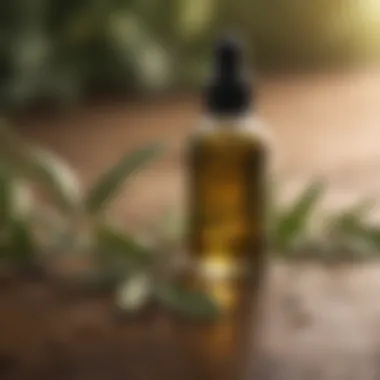Unveiling the Health Benefits of Olive Leaf Extract for Blood Pressure Management


Well-Being Overview
In this meticulous exploration of the benefits of olive leaf for blood pressure, we delve deep into the potential implications for cardiovascular health. Olive leaf, with its rich nutritional components, has been a subject of scientific interest in its possible impact on managing blood pressure levels. Understanding the mechanisms through which olive leaf interacts with the cardiovascular system sheds light on its potential benefits. By uncovering the various aspects of olive leaf's effects on blood pressure, we aim to provide a comprehensive guide on its role in promoting overall well-being.
Mental Health Matters
Among the key elements to consider when exploring the benefits of olive leaf in managing blood pressure is its potential impact on mental health. Understanding how blood pressure regulation can affect mental well-being is essential. Alongside the focus on olive leaf's benefits, we also look into strategies for improving mental health and coping mechanisms for stress and anxiety. This section aims to provide insights into the holistic approach required for overall well-being.
Physical Wellness
Physical wellness is closely intertwined with blood pressure management, making it integral to this discussion. Incorporating appropriate exercise routines and tips is crucial, as well as highlighting the significance of healthy eating habits. Additionally, emphasizing the importance of regular physical activity in conjunction with potential olive leaf benefits can offer a well-rounded approach to enhancing cardiovascular health.
Mindfulness & Self-Care Practices
Exploring mindfulness techniques alongside the potential benefits of olive leaf can provide a comprehensive approach to managing blood pressure. Engaging in self-care rituals for rejuvenation and finding a balance between work and relaxation are essential aspects of promoting overall well-being. This section delves into the importance of mindfulness and self-care in the context of cardiovascular health.
Nutrition for Nourishment
The role of nutrition in nourishing the body complements the discussion on managing blood pressure effectively with the support of olive leaf. Understanding the benefits of a balanced diet and incorporating nutrient-rich foods is essential for overall well-being. Providing easy and healthy recipes to try can further enhance the reader's understanding and implementation of a holistic approach to cardiovascular health.
Introduction to Olive Leaf and Blood Pressure


Olive leaf, a gem in the realm of natural remedies, has garnered attention for its potential benefits in managing blood pressure, heralding a new era in holistic healthcare strategies. The synergy between olive leaf extract and blood pressure regulation unveils a fascinating narrative of herbal efficacy meeting cardiovascular well-being. As we embark on this insightful journey, we unravel the intricate interplay between this botanical extract and its influence on blood pressure dynamics and systemic health.## erstanding Olive Leaf Extract ## Ol leaf extract, a herbal elixir cherished for its medicinal properties through the ages, encompasses a rich tapestry of constituents that contribute to its therapeutic prowess. The composition of olive leaf extract is a concoction of bioactive compounds, with oleuropein reigning as the star player. Oleuropein, renowned for its antioxidative and vasodilatory effects, serves as the cornerstone of olive leaf's health benefits, underscoring its significance in this discourse. Historically regarded as a botanical panacea, olive leaf extract's emergence in modern wellness narratives echoes its timeless relevance in promoting vitality and resilience.## Compo on of Olive Leaf Extract ## Step int e domain of olive leaf's essence, where the composition of this botanical marvel weaves a tale of potency and purity. Enriched with polyphenols, flavonoids, vitamins, and minerals, olive leaf extract embodies nature's pharmacy, offering a holistic approach to health. The symphony of these bioactive molecules orchestrates a harmonious melody of wellness, promoting cellular health, inflammation modulation, and oxidative balance. Embrace the essence of olive leaf extract, a testament to nature's wisdom distilled for cardiovascular sustenance.## Historical of Olive Leaf ## Delve into the als of history, where olive leaf's legacy as a medicinal treasure trove unfolds with grace and grandeur. From ancient civilizations to contemporary times, olive leaf has adorned traditional remedies with its legacy of healing virtues. Its historical uses span cultures and epochs, symbolizing resilience, restoration, and reverence for nature's bountiful offerings. Traverse through time with olive leaf as your guide, embracing the perennial wisdom of ancestral health traditions reimagined for modern well-being.## Overview of Blood ssure ## The symphony of bloo essure orchestration plays a pivotal melody in the opera of cardiovascular wellness, shaping the intricacies of circulatory dynamics and systemic equilibrium. Understanding the impact of high blood pressure unveils the silent assailant lurking within, flexing its influence on arterial health and cardiac resilience. As we delve into the nuances of blood pressure management, the imperative of vigilance and care emerges as a beacon guiding us towards optimal cardiovascular vitality.## Impact of High Blood Pr re ## Witness the ominous shadow t by high blood pressure, a silent predator prowling through the corridors of vascular health. The repercussions of unchecked hypertension reverberate across organ systems, heralding a cascade of complications and jeopardizing the delicate balance of cardiovascular harmony. Exploring the impact of high blood pressure illuminates the urgency of proactive measures, advocating for awareness, lifestyle modifications, and therapeutic interventions to safeguard against the insidious tyranny of elevated blood pressure.## Importance of Blood Pressure gement ## Amidst the tumultuous seas of he considerations, the beacon of blood pressure management shines bright, illuminating the path towards cardiovascular well-being. Cultivating a culture of attentiveness towards blood pressure echoes the ethos of preventive healthcare, empowering individuals to embrace proactive measures in safeguarding their heart's refrain. The significance of blood pressure management permeates through the tapestry of holistic wellness, emphasizing the pivotal role of self-care and mindfulness in nurturing a resilient cardiovascular foundation.
Scientific Research on Olive Leaf and Blood Pressure
Scientific research on olive leaf and blood pressure plays a crucial role in understanding the potential benefits of incorporating olive leaf into blood pressure management strategies. It provides valuable insights into the physiological effects of olive leaf extract on blood pressure regulation and cardiovascular health. By examining clinical studies and mechanisms of action, researchers aim to unravel the specific compounds in olive leaf that contribute to its hypotensive properties and antioxidant capacity. Understanding the scientific foundation behind olive leaf's impact on blood pressure allows health professionals, wellness coaches, and nutritionists to make informed recommendations for their clients' well-being.
Clinical Studies on Olive Leaf Extract
Effects on Systolic Blood Pressure
Exploring the effects of olive leaf extract on systolic blood pressure reveals compelling results from various clinical trials. These studies have demonstrated the potential of olive leaf to reduce systolic blood pressure levels significantly. The key characteristic of this effect lies in the ability of specific compounds present in olive leaf to induce vasodilation and improve blood flow. This vasodilatory action promotes relaxation of arterial walls, leading to a decrease in systolic pressure. Health experts consider this mechanism a beneficial strategy for individuals seeking natural approaches to blood pressure management.
Effects on Diastolic Blood Pressure
Investigating the impact of olive leaf extract on diastolic blood pressure showcases its efficacy in lowering diastolic pressure readings. Clinical evidence suggests that regular consumption of olive leaf can help relax blood vessels and enhance diastolic function. The unique feature of olive leaf's effect on diastolic blood pressure lies in its ability to reduce peripheral resistance, thereby supporting optimal blood circulation. While there may be variations in individual responses, incorporating olive leaf as a dietary supplement shows promise in improving diastolic blood pressure profiles.
Mechanisms of Action
Role of Oleuropein in Blood Pressure Regulation
Delving into the role of oleuropein in blood pressure regulation unveils the bioactive compound's significant influence on cardiovascular health. Oleuropein, abundantly found in olive leaves, exerts antihypertensive effects by modulating various pathways involved in blood pressure control. Its key characteristic lies in promoting vasodilation and inhibiting vasoconstriction, ultimately leading to a reduction in blood pressure levels. Health professionals recognize oleuropein as a powerful ally in supporting optimal blood pressure regulation through its multifaceted physiological actions.
Antioxidant Properties and Vasodilation


Exploring the antioxidant properties and vasodilatory effects of olive leaf illuminates its role in combating oxidative stress and improving vascular function. Olive leaf's antioxidant compounds help neutralize free radicals that can negatively impact cardiovascular health. Additionally, its vasodilatory effects support endothelial function by enhancing nitric oxide production and relaxing blood vessels. The unique feature of olive leaf's antioxidant and vasodilatory properties lies in their synergistic action, offering a holistic approach to maintaining healthy blood pressure and cardiovascular well-being.
Nutritional Profile of Olive Leaf
In this article, delving into the Nutritional Profile of Olive Leaf is paramount. The richness of nutrients in olive leaves plays a crucial role in their potential benefits for blood pressure management. Key elements such as Polyphenols, Flavonoids, Vitamins, and Minerals are essential components that contribute to the overall health benefits associated with Olive Leaf. Understanding these nutritional aspects provides a foundation for comprehending how Olive Leaf may positively impact cardiovascular health. Considering the Nutritional Profile of Olive Leaf enables a holistic approach to utilizing its potential advantages for well-being.
Key Nutrients in Olive Leaf
- Polyphenols and Flavonoids: Among the key nutrients in Olive Leaf, Polyphenols and Flavonoids stand out for their significant contributions. These compounds possess potent antioxidant properties, helping to combat oxidative stress and inflammation in the body. Their ability to promote cardiovascular health and regulate blood pressure makes them valuable additions to dietary considerations. While Polyphenols and Flavonoids offer numerous benefits, it is important to note their potential interactions with certain medications, necessitating caution in consumption.
- Vitamins and Minerals: Another crucial aspect of Olive Leaf's nutritional profile is its richness in essential vitamins and minerals. These micronutrients, including Vitamin C, Vitamin E, and various minerals, play integral roles in supporting overall health and well-being. The presence of these vitamins and minerals in Olive Leaf enhances its potential health benefits, offering a natural source of essential nutrients that can aid in blood pressure management. However, individuals should be mindful of their intake, as excessive consumption may lead to adverse effects.
Potential Health Benefits
- Anti-Inflammatory Effects: Olive Leaf exhibits remarkable anti-inflammatory effects, attributed to compounds like Oleuropein. These properties help reduce inflammation within the body, which is crucial in mitigating conditions that contribute to high blood pressure. Incorporating Olive Leaf into one's lifestyle may alleviate inflammation-related symptoms and support overall cardiovascular health. Despite these benefits, individuals with specific health conditions should seek guidance from healthcare professionals before extensive usage.
- Antioxidant Properties: The antioxidant properties of Olive Leaf play a pivotal role in preserving cardiovascular health. By scavenging free radicals and reducing oxidative stress, these properties help maintain proper blood flow and arterial function. The inclusion of Olive Leaf in dietary plans can provide a natural boost to the body's antioxidant defense system, potentially aiding in blood pressure regulation. However, individuals with existing medical conditions should exercise caution and consider consulting with healthcare providers prior to extensive use.
Incorporating Olive Leaf into Lifestyle for Blood Pressure Management
Incorporating Olive Leaf into Lifestyle for Blood Pressure Management is a crucial aspect to consider amidst the realm of health and wellness. This section delves into the intricate details of how this natural element can positively impact blood pressure regulation. By integrating Olive Leaf into one's daily routine, individuals can potentially experience significant improvements in their cardiovascular health. This article focuses on shedding light on the specific elements and benefits associated with Incorporating Olive Leaf into Lifestyle for Blood Pressure Management.
Supplementation and Dosage
Recommended Dosage Guidelines


Recommended Dosage Guidelines for Olive Leaf supplementation play a pivotal role in optimizing its health benefits. Understanding the exact dosage required for maximum efficacy is essential for individuals looking to harness the potential advantages of Olive Leaf. This section emphasizes the importance of adhering to these guidelines to achieve desired results. It highlights the consistency and precision required in dosage measurements, underlining why following Recommended Dosage Guidelines is a pragmatic choice for promoting cardiovascular well-being. Furthermore, it expounds on the distinct feature of Recommended Dosage Guidelines and elaborates on how they can contribute to the overarching objectives of this article.
Considerations for Safe Use
When it comes to Incorporating Olive Leaf into Lifestyle for Blood Pressure Management, ensuring Safe Use practices is paramount. This sub-section outlines the key considerations necessary to guarantee the safe and effective utilization of Olive Leaf. Highlighting factors such as potential contraindications with other medications or supplements, this segment aims to provide comprehensive insights into fostering a secure environment for incorporating Olive Leaf. By discussing the unique facets of Considerations for Safe Use, readers can grasp the intricacies involved in maximizing the benefits of Olive Leaf while maintaining a focus on safety protocols.
Culinary Uses of Olive Leaf
Exploring the culinary realm, Olive Leaf offers a versatile approach to enhancing everyday meals and beverages. Cooking with Olive Leaf presents an opportunity to infuse dishes with added nutritional value and a unique flavor profile. By incorporating Olive Leaf in various recipes, individuals can not only savor delightful flavors but also reap the potential health benefits it offers. This section delves into the nuances of Cooking with Olive Leaf, shedding light on how this culinary practice can be a game-changer in promoting cardiovascular wellness.
Tea Infusions and Recipes
Tea lovers are in for a treat with Olive Leaf tea infusions and recipes. Transforming a simple cup of tea into a health-boosting elixir, Olive Leaf additions bring a refreshing twist to traditional beverage options. This segment explores the art of Tea Infusions and Recipes using Olive Leaf, emphasizing the simplicity and elegance it can add to one's daily routine. By elaborating on the advantages of Tea Infusions and Recipes featuring Olive Leaf, readers can discover a newfound appreciation for this ancient practice in modern health management.
Potential Risks and Considerations
When delving into the potential benefits of olive leaf for blood pressure management, it becomes paramount to also illuminate the potential risks and considerations that might accompany its usage. Understanding the nuances of how olive leaf interacts with medications and the plausible allergic reactions it may provoke broadens our comprehension of its holistic impacts. These considerations serve as a crucial cornerstone in the foundation of knowledge surrounding olive leaf's effects on cardiovascular health. By shedding light on the potential risks and considerations, we equip ourselves with the requisite wisdom to make informed decisions regarding the integration of olive leaf into our lifestyles.
Interactions with Medications
Blood Thinners and Hypertension Medications
Exploring the realm of interactions between olive leaf and medications unveils a significant aspect - the relationship with blood thinners and hypertension medications. When scrutinizing the holistic landscape of blood thinners and hypertension medications, their pivotal role in managing conditions becomes glaringly evident. The utilization of such medications underscores a strategic approach towards health maintenance, particularly in the realm of cardiovascular fitness. Understanding the unique characteristics of blood thinners and hypertension medications reveals their efficacy in addressing various health concerns. We dissect the advantages and disadvantages of incorporating blood thinners and hypertension medications alongside olive leaf, offering a comprehensive view of their combined effects on blood pressure levels.
Allergic Reactions
Potential Allergens in Olive Leaf
Turning our attention towards the sphere of allergic reactions, we navigate through the potential allergens in olive leaf and their implications. By spotlighting the key characteristics of potential allergens in olive leaf, we gain insights into their significance within the context of blood pressure management. Unraveling the unique features of potential allergens in olive leaf allows us to discern the advantages and disadvantages they may present when considering the integration of olive leaf into our daily routines. The exploration of allergic reactions to olive leaf illuminates a crucial aspect of its usage, enhancing our understanding of the intricacies involved in optimizing cardiovascular health.



